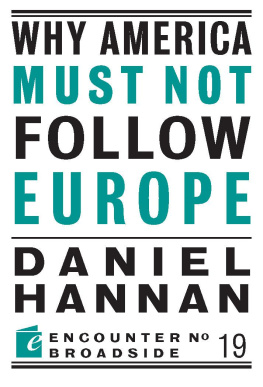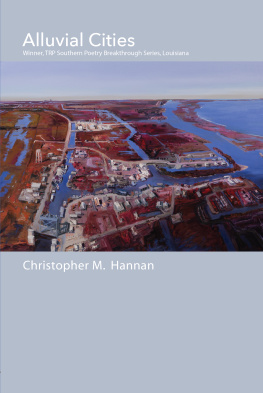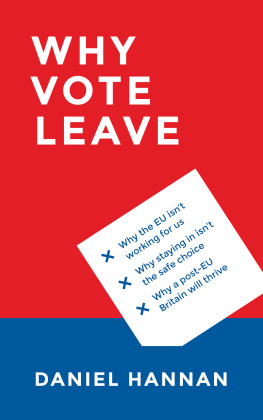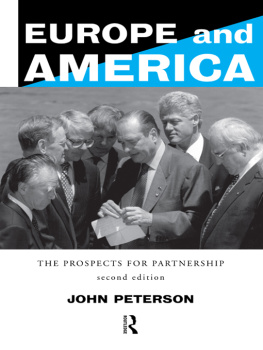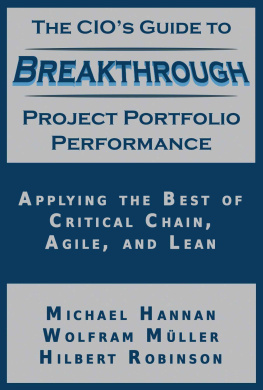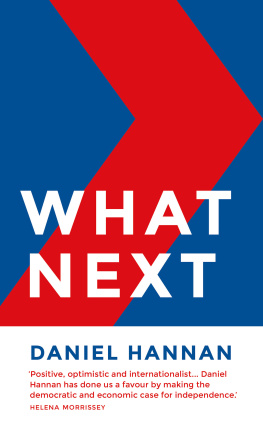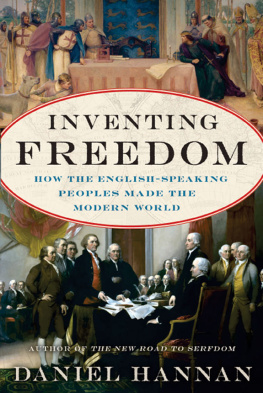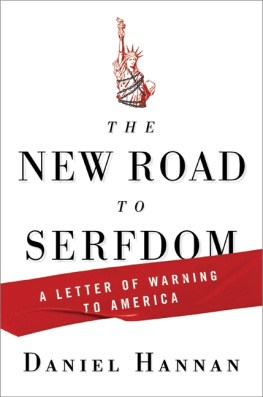Hannan - Why America Must Not Follow Europe
Here you can read online Hannan - Why America Must Not Follow Europe full text of the book (entire story) in english for free. Download pdf and epub, get meaning, cover and reviews about this ebook. year: 2011, publisher: Encounter Books, genre: History. Description of the work, (preface) as well as reviews are available. Best literature library LitArk.com created for fans of good reading and offers a wide selection of genres:
Romance novel
Science fiction
Adventure
Detective
Science
History
Home and family
Prose
Art
Politics
Computer
Non-fiction
Religion
Business
Children
Humor
Choose a favorite category and find really read worthwhile books. Enjoy immersion in the world of imagination, feel the emotions of the characters or learn something new for yourself, make an fascinating discovery.
Why America Must Not Follow Europe: summary, description and annotation
We offer to read an annotation, description, summary or preface (depends on what the author of the book "Why America Must Not Follow Europe" wrote himself). If you haven't found the necessary information about the book — write in the comments, we will try to find it.
Why America Must Not Follow Europe — read online for free the complete book (whole text) full work
Below is the text of the book, divided by pages. System saving the place of the last page read, allows you to conveniently read the book "Why America Must Not Follow Europe" online for free, without having to search again every time where you left off. Put a bookmark, and you can go to the page where you finished reading at any time.
Font size:
Interval:
Bookmark:
O n a U.S. talk-radio show recently, I was asked what I thought about the notion that Barack Obama had been born in Kenya. Pah! I replied (or words to that effect). Your president was plainly born in Brussels.
American conservatives have struggled to press President Obamas policies into a meaningful narrative. Is he a socialist? Not exactly, at least not in the traditional sense of wanting the state to own key industries. Is he, as Dinesh DSouza argues, actuated by the 1950s anticolonialism of his absent, but idealized, father? Perhaps, but in domestic terms, this doesnt take us very far. Is he then a straightforward New Deal big spender, in the model of FDR and LBJ? Up to a point.
What all these interpretations have in common is that they seek to define the president in American terms. But looking across from my side of the Atlantic, there seems to be a much simpler explanation. President Obama wants to Europeanize America. All right, he wouldnt put it in those terms, partly because the electorate wouldnt wear it and partly because he sees himself as less Eurocentric than any of his 43 predecessors.
My guess is that if anything, Obama would verbalize his ideology using the same vocabulary that Eurocrats do. He would say he wants a fairer America, a more tolerant America, a less arrogant America, a more engaged America. When you prize away the clich, what these phrases amount to are higher taxes, less patriotism, a bigger role for state bureaucracies, and a transfer of sovereignty to global institutions. In other words, President Obama wants to make the U.S. more like the EU.
He is not pursuing a set of random initiatives lashed arbitrarily together but a program of comprehensive Europeanization: European health care, European welfare, European carbon taxes, European day care, European college education, even a European foreign policy, based engagement with supranational technocracies, nuclear disarmament, and a reluctance to deploy forces overseas.
No previous president has offered such uncritical support for European integration.
Its hardly surprising that Obama should be such an enthusiast for a European superstate: He is building his own version at home.On his very first trip to Europe as president, Obama declared, In my view, there is no Old Europe or New Europe. There is a united Europe. Having silkily dispensed with the old Rumsfeldian idea that the U.S. should deal with EU states as individual nations, he went on to dismiss the Euroskeptic majorities in most European countries: I believe in a strong Europe, and a strong European Union, and my administration is committed to doing everything we can to support you.
Its hardly surprising that Obama should be such an enthusiast for a European superstate: He is building his own version at home. The critical difference between the European and American unions has to do with the location of power. The foundational doctrine of the U.S. was that decisions should be decentralized for the people they affect. The framers had seen firsthand what happened when power was concentrated and were determined to keep their rulers in check. The EU had precisely the opposite foundational imperative. Its patriarchs, scarred by the experience of the Second World War, were determined to merge their nations, to centralize power, and to ensure that decisions were vested in the hands of neutral experts who didnt need to worry about public opinion.
The preoccupations of the two sets of founding fathers are visible in the debates that surrounded their charters, as well as in the documents themselves. The U.S. Constitution is concerned with the diffusion and democratization of power. The EU Treaties, by contrast, commit their signatories, in Article 1, to establish an ever-closer union. The U.S. Constitution, with all its amendments, is 7,200 words long. The EU Constitution, now formally known as the Lisbon Treaty, is 76,000. The U.S. Constitution concerns itself with broad principles, such as the balance between state and federal authorities. The EU Constitution busies itself with such minutiae as space exploration, the rights of disabled people, and the status of asylum seekers. The U.S. Constitution, in particular the Bill of Rights, is mainly about the liberty of the individual. The EU Constitution is mainly about the power of the state.
Here is the categorical difference between the two unions, the elemental distinction of which all the other differences are aspects. Because the U.S. was designed along what we might loosely term Jeffersonian lines, it has tended to have a small government, strong local authorities, a flourishing private sphere, a limited welfare system, relatively low taxes, and skepticism toward global technocracies. The EU, having been conceived around the concept of an ever-closer union, tends the opposite way.
The U.S. Constitution is mainly about the liberty of the individual. The EU Constitution is mainly about the power of the state.I dont doubt the sincerity of those Americans who want to copy the European model. A few may be snobs who wear their Euro-enthusiasm as a badge of sophistication. But most genuinely believe that making their country less American, more like the rest of the world, would make it more comfortable and peaceable. All right, growth would be slower, but the quality of life might improve. All right, taxes would be higher, but workers need no longer fear sickness or unemployment. All right, the U.S. would no longer be the worlds superpower, but perhaps that would make it more popular. Is a European future truly so terrible?
Yes. Take it from me, my friends. I have been an elected Member of the European Parliament (MEP) for 11 years. I have seen firsthand what the European political model means. I inhabit your future or at least the future toward which your current rulers seem intent on taking you. Before you follow us, let me tell you a few things about it.
W HY A MERICANS A RE R ICHER T HAN E UROPEANS
Many Americans, and many Europeans, have a collective memory of how Europeans managed to combine economic growth with social justice. Didnt Western Europe do tremendously well after the Second World War? Wasnt its success associated with something called Rhineland capitalism or the social market? (This latter phrase calls to mind F. A. Hayeks observation that Social is a weasel word that has acquired the power to empty the nouns it qualifies of their meanings.)
Like most folk memories, the idea of a European economic miracle has some basis in fact. Between 1945 and 1974, Western Europe did indeed outperform the U.S. And in retrospect, we can see why. Europe happened to enjoy perfect conditions for rapid growth. Infrastructure had been destroyed during the war, but an educated, industrious, and disciplined workforce remained. There was also, for the first time in Europes history, mass migration. Within individual nations, people moved in unprecedented numbers from the countryside to the growing cities. Within Europe, they journeyed from the Mediterranean littoral to the coalfields and steelworks of northern Europe. And millions more came from beyond Europe from North Africa, Turkey, and the former British, French, and Dutch colonies.
As if all these advantages were not enough, Europe received a massive external stimulus. Thirteen billion dollars were disbursed through the Marshall Plan between 1948 and 1952, on top of the $ 12 billion already given by the U.S. in aid since the end of the war. Colossal as these transfers were by the standards of the time, Europe was receiving an even more valuable gift in the form of the U.S. security guarantee. The defense budgets of most Western European states were, as a percentage of gross domestic product, around a quarter of that of the U.S. (Britain and France were exceptions.) The money that was freed up by low military spending could be spent instead on civil programs.
Next pageFont size:
Interval:
Bookmark:
Similar books «Why America Must Not Follow Europe»
Look at similar books to Why America Must Not Follow Europe. We have selected literature similar in name and meaning in the hope of providing readers with more options to find new, interesting, not yet read works.
Discussion, reviews of the book Why America Must Not Follow Europe and just readers' own opinions. Leave your comments, write what you think about the work, its meaning or the main characters. Specify what exactly you liked and what you didn't like, and why you think so.

